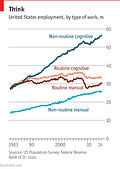HRHeadStart #51: PowerSkills; Design Thinking; Value of Constraints
The Talent Agenda
The skill composition of the labour markets has been shifting for years. We can use two simple criteria to understand the fundamental nature of jobs:
Cognitive vs. Manual: Does the job require intellectual activities like thinking, reasoning etc. or does it require physical effort?
Routine vs. Non-routine: Does the job tasks vary every time they are performed or they are the same?
Research shows that, over the long term, non-routine cognitive jobs (e.g. managers, data scientists, artists etc.) and non-routine manual jobs (e.g. personal care, healthcare, food preparation etc.) have grown while routine jobs (whether cognitive or manual) have declined. It’s also interesting o note that the routine jobs declined in recessionary periods (like early 1990s, 2000s and 2007-2009), bu non-routine jobs bounced back well. A possible explanation is that technology and other productivity levers helped create better types of jobs.
Focusing specifically on non-routine cognitive jobs, a question to think about is what skills will differentiate performance in these jobs. IBM research highlights that C-suite leaders are not just looking for technical skills, but instead prioritize behavioural skills for critical roles. Josh Bersin and his team have identified a list of these behavioural skills and they call it PowerSkills.
How are you enabling behavioural skills development in your organization?
Working Better
Design Thinking is a powerful and iterative way to understand your users, challenge assumptions, redefine problems and creative innovative solutions to prototype and test. It is not exclusive to designers and has been widely adopted in functions like engineering, marketing, business operations and HR. To make it easy to learn this skill and apply frameworks/tools in your next project, here is a helpful resource. You can dive into each step of the Design Thinking methodology (Understand, Define, Sketch, Decide, Prototype, Validate) and leverage tools from leading organizations.
Tiny Thought
Celebrate constraints - they show you the work you can actually do.



